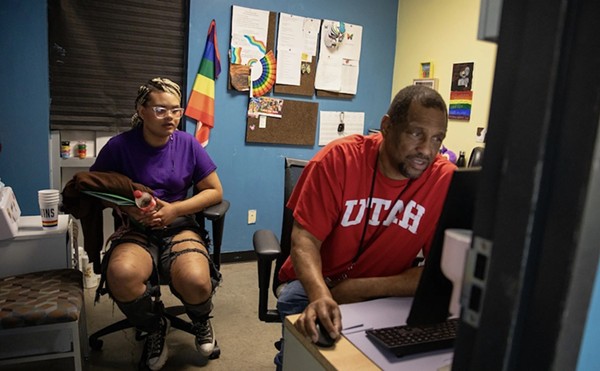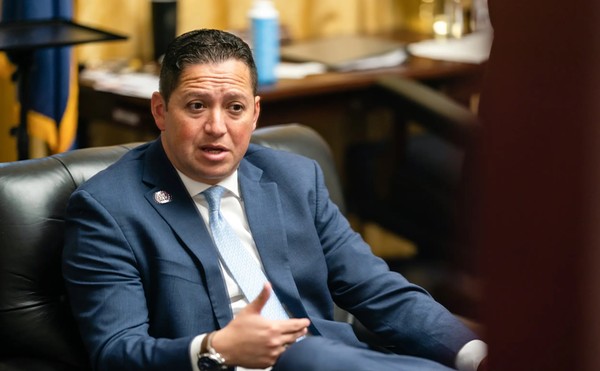On September 15, 2009, in an act of unprecedented solidarity, professors from four of San Antonio’s community colleges delivered an overwhelming vote of no confidence in Chancellor Bruce Leslie to the Alamo Colleges Board of Trustees. Faculty participation in the separate campus votes averaged 80 percent, and the votes against Leslie were near-unanimous, with a low of 91 percent at St. Philip’s College, and a high of 99 percent at Palo Alto.
When St. Philip’s Faculty President George Johnson ran out of his allotted speaking time that night, a woman in the audience ceded him her three minutes, which he used to call for Leslie’s immediate resignation.
“Dr. Leslie has repeatedly and consistently refused transparent dialogue with faculty and staff. His actions signal a refusal to listen to key stakeholders at this college. In an email, Dr. Leslie ordered faculty to cease and desist investigating the impact of single accreditation. That’s chilling free speech in the district,” Johnson told the assembled crowd. “Moreover, Dr. Leslie has repeatedly refused to allow records to be kept in meetings with faculty and staff. … The faculty believe that these actions are deliberate and made in an attempt to keep us unaware and uninformed. … Dr. Leslie has forgotten that faculty must drive curriculum.”
A wall of professors stood behind Johnson in a display of solidarity, and thunderous applause followed his address. It was the first time in the history of the 64-year-old community-college district that a chancellor received a vote of no confidence — and the irony couldn’t have been lost on Leslie, whose unpopularity stems in large part from his attempts to unify the colleges. Although the conflict has simmered quietly over the holidays, with the return of students this week and yesterday’s public meeting on the contentious issue of accreditation, it likely won’t remain that way for long.
The five campuses that make up the district are governed by a single board of trustees and marketed collectively as the Alamo Colleges, but they have distinct identities. St. Philip’s College, well-known for its culinary arts and technical programs, was founded in 1898 and is the only college in the nation designated both a Historically Black College and a Hispanic-serving institution. San Antonio College, founded in 1925, supports a renowned art department `see “Art missions,” January 28, 2009` and the popular local radio station KSYM, and produces an award-winning student paper, The Ranger. Palo Alto is designed specifically to meet the needs of first-generation college students, and relative newcomer Northwest Vista is the fastest-growing college in the U.S., according to AC board member James Rindfuss.
In San Antonio and across the country, community colleges provide crucial educational opportunities to high-school graduates and GED students. This past fall, more than 60,000 students attended the Alamo Colleges, with the majority, 22,028, enrolled at SAC. Texas community colleges — also known as junior colleges and two-year colleges — enrolled 703,051 students this year, according to the Texas Higher Education Coordinating Board, a significant portion of the 1.3 million students enrolled in college statewide.
“Community colleges are open-door institutions, welcoming students turned away by many four-year college,” authors Thomas Bailey and Jim Jacobs noted last October in the American Prospect. “Thus, improving outcomes for community college students will have a disproportionate positive effect on minority and low-income students. There are, for example, more low-income African American and Hispanic students at Bronx Community College alone that there are in the entire Ivy League.”
Community colleges are also wildly less expensive than most four-year institutions. At the Alamo Colleges, 12 hours of credit currently run $781; at the University of Texas at San Antonio, $3,808.70.
ALL FOR ONE/ONE FOR ALL?
One of the most contentious issues under Leslie’s leadership has been accreditation. Faculty at the colleges suspect that the Chancellor is bent on abandoning the current independent-accreditation model in favor of single accreditation for the entire district. They point to moves to standardize the curriculum and rebrand the distinct campuses as a single entity as evidence that Leslie’s mind is already made up. More evidence, they say: a unified transcript and grade-point average, and the Faculty Relocation Between Colleges Plan, which may force professors to teach at multiple colleges.
On December 16, after five months of research, the 21-member Accreditation Review Committee commissioned by AC Board of Trustees Chair Denver McClendon issued an 86-page report that concluded pursuing single accreditation for the district would take about five years and cost $1.83 million over the course of the decade. Maintaining independent accreditation would run about $4.18 million over the same period. Although the district as a whole might stand to save more than $2 million if it pursued single accreditation, St. Philip’s College would most likely lose its status as a Historically Black College, endangering $5-7 million annually in federal grants. In the unlikely event that St. Philip’s could successfully appeal to the Department of Education to maintain its HBCU status, the other colleges could lose hundreds of thousands of dollars each year because the DOE only permits a college to receive federal grants for being either a Historically Black College or a Hispanic-serving institution, not both — and the Alamo Colleges would be considered one institution if singly accredited.
Nor would single accreditation provide a quick fix for one of the most pressing issues Leslie faces: Getting Northeast Lakeview College accredited. San Antonio College, Palo Alto, St. Philip’s, and Northwest Vista are independently accredited by the Southern Association of Colleges and Schools. In December, SACS rebuffed Northeast Lakeview’s application for candidacy. In an article in The Ranger, Professor Jeff Hunt, chair of the San Antonio College theater and speech communication department, president of SAC’s faculty senate, and co-chair of the Accreditation Committee, blamed the board of trustees for pressuring Northeast Lakeview to apply for accreditation before it was ready. Northeast Lakeview’s status places an extra burden on San Antonio College, which is supervising 80 percent of NLC’s programs. If the colleges threw their lot in together, the committee reported, the single accreditation process could take up to five years, after which time Alamo Colleges could apply for accreditation for Northeast Lakeview — which could take up to five more years to achieve.
Ed DesPlas, executive vice chancellor of the Dallas Community College System, the only other community college system in Texas that has independently accredited colleges, says maintaining distinct institutions makes it easier to build relationships with area high schools and recruit students. Moving to a single-accreditation model, and the accompanying centralized bureaucracy “would affect the responsiveness and the quality of the relationship that the communities enjoy with independently accredited colleges,” he said.
Board member James Rindfuss (father of Current Listings Editor Bryan Rindfuss) says he still sees potential benefits in seeking single accreditation. He says that 10 percent of the district’s students attend more than one college at any given time, and they run into bureaucratic red tape when they try to transfer. “The board even went to the trouble of passing a policy that required all credits be accepted among our various colleges,” he said. “I’ve had students complain to me that they had to go and get a transcript from each college, and that’s ridiculous.”
Rindfuss said that “the biggest impediment” to single accreditation is the threat to St. Philip’s Historically Black Colleges and Universities designation, and the funding attached to that — which, he added, was news to the board of trustees.
“I want to promise you that we would have not known that there was $5 to $7 million that St. Philip’s was getting every year had we not been pressing to consolidate. ... Do the black students at St. Philip’s College get particular benefits from this? ... they are going to make a presentation to us and tell us how they’ve been spending the money that the board was not even aware that they had access to.”
St. Philip’s President Adena Loston could not be reached for comment before deadline, and PR Director Matari Gunter declined to comment.
Rindfuss acknowledges that many of the benefits of single accreditation — saving taxpayers money and streamlining the process for students, for instance — can be obtained other ways, but he thinks those conversations wouldn’t have happened if the district hadn’t explored single accreditation. “Suddenly, when `faculty` feel the pressure coming from single accreditation, then they are going to show us how without doing single accreditation,” he said. “And I think we should be able to.”
A dirty-
laundry list
The single-accreditation issue encompasses many of the faculty’s grievances with the current district leadership, but the list hardly ends there. Complaints range from increasing class sizes to rising daycare rates, and touches on nearly every conceivable topic in between.
Dr. Paul Martinez, vice president of the faculty senate at Northwest Vista College, told the Current that he is especially concerned about the curriculum changes that were first instituted in 2008. The standardization process has been driven by the administration, he says, with little faculty input, and he worries that creating a single curriculum for the diverse colleges will prevent professors from developing classes tailored to their specific student populations.
When the faculty senate at Northwest Vista sent a letter to Leslie complaining that curriculum alignment is “fundamentally at odds with the basic principles of governing independently accredited institutions,” SAC’s faculty senate sent a letter in solidarity.
Dr. Thomas Billimek, chairman of SAC’s psychology department, has been with the district for 37 years. He says the standardization of courses would be more appropriately called “course conformity.” In order to meet the standardization requirements, Billimek said, he had to drop general psychology as a prerequisite to several courses, including psychology of adjustment, childhood psychology, and human sexuality.
“I would have rather not capitulated,” he said. “These were directives that came down from district, so there really wasn’t any opportunity to formulate anything up front — This is what you’re going to do, so do it.”
Billimek says course standardization also doesn’t make sense because the departments don’t share the same goals across campuses. For instance, he claims, SAC’s psychology department — which currently has 600 students enrolled — is committed to transferring students to four-year colleges for upper-division work, whereas other college departments merely offer the coursework. Although college-level reading-skill requirements have been standardized across the psychology departments, writing skills have not, and Billimek says attempts have been made to implement district-wide bars that are lower than his department’s college-level requirement.
“The take that I get is that you can disagree,” Billimek says, “but we are not going to approve it until you see it our way.”
Professor Christy Woodward Kaupert of SAC’s political-science department told the Current that a disproportionate number of students at St. Philip’s College, for example, come from Title 1 Schools, schools that have the highest concentrations of impoverished families. The prerequisite standards for this group of students, in general, she says, would not be suitable for SAC students, and vice-versa.
But Chancellor Leslie, in an interview with the Current, said that critics who claim that standards are being lowered across the district are simply wrong: “We have a mission to define one high standard for all the colleges.”
Rindfuss blames “a longstanding feeling of superiority” among SAC’s faculty for much of the resistance to standardization and single accreditation. “It’s not because they really care about St. Philip’s,” he said. “It’s because they don’t want single accreditation.”
“The whole objective was to standardize our curriculum in such a way that it was able to be transferred without loss of credits to the four-year universities,” he said.
Faculty members who spoke with the Current are also concerned about the district’s hiring practices. Leslie’s goal for the district is to decrease the number of classes taught by full-time professors by 15 percent at SAC and on average across the district by 6 percent, to achieve a 50:50 ratio of classes taught by full-time and part-time professors. Billimek says he could support a 60:40 ratio of full-time to part-time, but not 50:50. The ratio was once 70:30, he said, when priorities were different.
“I think there has been a callous disregard for the continuity of faculty,” Billimek said. “In any organization, you want to have some range — you want some senior folks, some intermediate folks, and you want some new folks.” He says the median age of his department is between 67 and 69. “I’m not talking about hiring additional faculty. I’m talking about, if I need 12 `full-time faculty` to run my classes with the adjuncts that I have available, I shouldn’t have to fight to recover some of those positions if someone retires.”
Dr. Anna Budzinski, chair of SAC’s foreign-languages department, said two of her department’s professors could not afford to live on part-time adjunct salaries, so she lost instructors in German and Chinese.
“`Budzinski` had a vision of making San Antonio College the center for language study, especially non-traditional languages,” Len McClure, who taught Chinese at SAC for three years, wrote in an open letter addressed to the board and Leslie. “I would have been happy to continue indefinitely earning a full-time salary without benefits, because I really enjoyed teaching. But I have a family to support, and a maximum income of $14,000 a year just does not make it in this world.”
Leslie again denies that there is a problem. “Number one, there has not been any loss of instructors,” he told the Current. “Forty full-time instructors were added this summer. … We actually have too many employees.” He also insists that he has increased the faculty’s role in decision-making. “Since I’ve been here, I’ve actually done more to expand governance `to include professors` than has ever been done in the history of this institution. So those are false claims,” he told the Current.
Hunt says that Leslie does meet often with professors’ representatives, but that the truth is that professors have “no power whatsoever.”
“There is the question of is this really shared governance or just a façade of shared governance,” Hunt says. In 2008, Leslie restructured the faculty representation system, giving final authority over decisions to the vice chancellors. “Whatever the VC ultimately wants is what happens in the end.”
“In order to make a change, you have to have someone following you. No one likes drastic change,” Hunt added. “And `Leslie` has brought drastic change in every facet of our work environment.”
A rough
transcript
September 15, the night that professors at the district’s five campuses announced their votes of no confidence, Chancellor Bruce Leslie told The Ranger, “‘I’m not threatened by it. ... I work for the board, and I work at the pleasure of the board, so that is obviously the primary responsibility that I have, and so doing their bidding is what I am charged to do.’”
The ACCD board of trustees hired Bruce Leslie in 2006, citing his extensive experience. Prior to his position in Connecticut, Leslie served as president of Onondaga Community College in Syracuse, New York, for 12 years. He has also held administrative positions at community colleges in Illinois, Texas, and Washington, and he received his Ph.D. in higher-education administration from the Community College Leadership Program at UT Austin.
Several months after his arrival at ACCD, Leslie successfully encouraged the board of trustees to give raises to top-level administrators, whose incomes put them in the top 10 percent of incomes in the nation, in one of the country’s poorest big cities. Leslie’s current salary — $313,000, not including a retention bonus and other perks, such as an auto allowance — nearly puts him in the top 1 percent of incomes in the nation.
Leslie, 62, has a history of resigning before his official time is up. He left the 12-college Connecticut Community College System in 1999 because campus presidents resisted his attempts to standardize the curriculum. Community College Week reported in ’99 that the presidents of all 12 CCCS colleges approached the board of trustees and requested Leslie’s resignation.
“We agreed that we were unable to agree in terms of the direction of the system,” Leslie told CC Week at the time. “I think that probably the issue came down to my belief that there needed to be some common standards across the system, and the colleges felt I was threatening their autonomy.’”
But of his current curriculum-fueled conflict at Alamo Colleges, Leslie says, “Nothing is similar at all.”
In 2006, Leslie resigned from the six-college Houston Community College System two-and-a-half years before his contract was due to expire because of disagreements with trustees, according to the Express-News. HCCS trustees did not return calls from the Current seeking comment. “`Your audience` will have to read between the lines,” said the receptionist.
The “official” version, as reported by the Houston Chronicle, comes from former board chairman Jay Aiyer, who pled guilty in June 2007 to a misdemeanor charge of tampering with a governmental record: “We are parting on great terms.” But in August 2004, amid allegations that HCCS trustees were practicing nepotism in violation of district policy, Houston Press reported that, “Instead of heeding complaints about the problems, the paterfamilias of HCCS, Chancellor Bruce Leslie, apparently has sanctioned a climate in which would-be whistle-blowers either stay quiet or live in fear of retribution.”
Leslie told the Current that the Alamo Colleges board of trustees gave him two directives upon his arrival: Improve student success and improve operational efficiencies. He has decreased operating costs by several-million dollars, Leslie said, and he also takes credit for retention, completion, and productive-grade rates, which have improved since his arrival.
If changes Leslie has made to the structure and compensation of college staff and faculty are controversial, they are hardly rare. Nationally over the past five years, reported journalist Gabriel Arana in a March 2009 Nation article, college administrators’ salaries have risen 35.6 percent. According to an American Federation of Teacher’s report from 2008, 70 percent of faculty in public universities and colleges are “contingent” faculty, either adjunct or non-tenured full-time faculty. And the American Association of University Professors reports that adjuncts account for about 70 percent of the payrolls at community colleges across the nation, a rise of about 43 percent since 1969.
“Some of these trends are natural,” Leslie said, after a skeptical remark about the data.
According to Linda Hill in AC’s department of legal services, the number of Alamo Colleges associate vice chancellors has doubled since 2006, from three to six. The number of vice chancellors has more than doubled since 2006, from two to five. And the number of assistants to these positions has doubled since 2006, from seven to 14.
But Leslie says he has not doubled the size of AC’s administration as critics claim. “In fact, all I did when I developed the current administrative model was I took current administrative positions and I reassigned them,” he told the Current, “so there was no net increase in the number of administrators. So, again, those are false claims; those are political claims.”
“I don’t know how he can say that with a straight face,” says Hunt.
McClendon says Leslie is “doing a good job … He accomplished those things that we asked him to do.” Pressed for examples, McClendon referred the Current to Leslie’s employment contract, then mentioned the improvement in the district’s bond ratings and unspecified increases in efficiencies and student success.
Rindfuss was more specific about his support for Leslie. “Number one, he followed the instructions of the board,” he said. “Number two, he has achieved cost savings that we have asked him to achieve. Number three, he has made registration easier for students. And number four, he has made it possible for students to now be in more than one college without having to submit a dual transcript.”
Board member Blakely Fernandez, who was appointed in November, says she doesn’t want to second-guess decisions made before she joined the board, but she cited other recent public instances of friction between college faculties and administration, and called it a “normal part of the academic universe.”
“It’s really an important and amazing part of academic freedom that the employees can speak so strongly their minds,” she said of the September votes of no confidence. “It really is a beautiful and important part of academia, but it is also a constant part of academia, so I think there is a context for it.” She added that the Accreditation Review Committee, which included students, business people, administration, and faculty, might provide a good model for tackling other contentious issues.
If single accreditation is in fact on Leslie’s to-do list, he may not be able to check it off. McClendon told the Current the Alamo Colleges “will likely remain independently accredited. Fernandez agreed, saying the Accreditation Committee report shows that single accreditation “would be detrimental to St. Philip’s, `and` St. Philip’s is too important to our community to pretend that we can somehow meet those needs another way.”
But Leslie’s immediate future seems secure. The same September night that four AC faculties reported their votes of no confidence in the chancellor, the board of trustees passed a resolution in support of Leslie. That show of confidence followed the August 2009 extension of Leslie’s contract through 2012.
“I think we are at the point where the board and the chancellor are, if not in total harmony, are as close in agreement as you can possibly get,” says SAC’s Billimek. “That I think is dangerous in any organization — there is no ability for checks and balances.” •

















